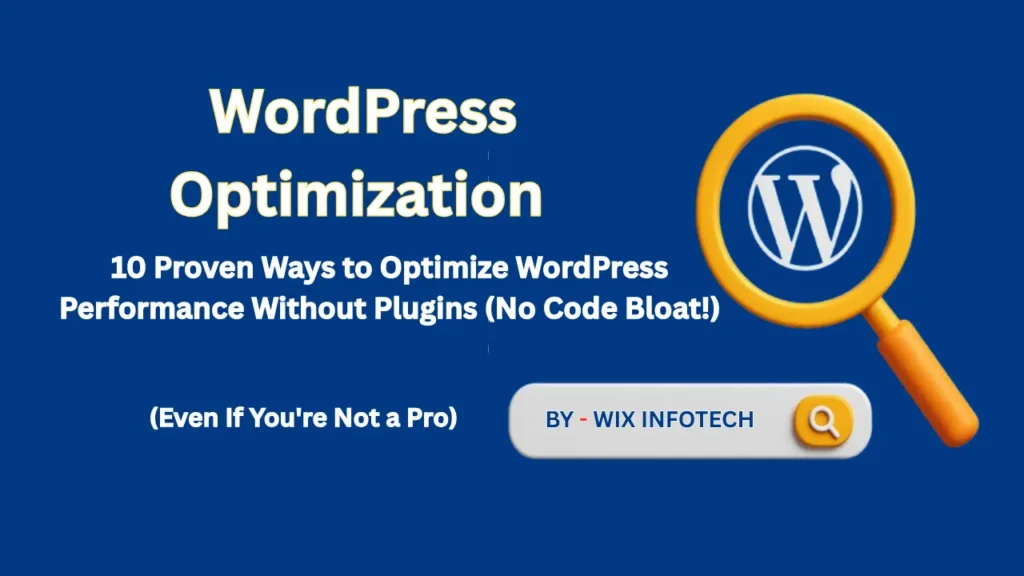Optimize WordPress performance without plugins to speed up your site, improve user experience, and avoid unnecessary security risks. While plugins offer convenience, too many of them can slow your website down and lead to performance issues. In fact, overusing plugins is one of the leading causes of sluggish WordPress sites. That’s why many developers and SEO experts now recommend manual optimization techniques that keep your site clean, fast, and secure — no extra plugins required.
Whether you’re running a business site, blog, or eCommerce store, optimizing WordPress performance without plugins can lead to:
-
Faster page load times
-
Higher search rankings
-
Better user experience
-
Lower bounce rates
Let’s break down 10 effective, plugin-free methods to get your WordPress site blazing fast.
1. Use a Lightweight Theme
Your theme is the backbone of your site. Heavy themes with bloated code, animations, and built-in features can drastically reduce performance. Choose a minimalist, performance-focused theme like GeneratePress, Astra, or Neve.
✅ Tip: Avoid themes with built-in sliders or page builders if you don’t need them.
2. Minimize HTTP Requests
Every image, script, and style file makes a separate request to the server. Too many = slow loading. Combine or remove unnecessary CSS and JS files manually.
✅ Pro Tip: Use your theme’s functions.php file to dequeue unused scripts.
3. Clean Up the WordPress Database
Over time, your WordPress database collects clutter like old revisions, trashed posts, and spam comments. Manually cleaning your database via phpMyAdmin can speed things up.
Only perform this if you’re comfortable working with databases — and always back up first.
4. Optimize Images Before Upload
Large, uncompressed images are a major drag on performance. Instead of relying on an image optimization plugin, compress your images before uploading using tools like TinyPNG or Squoosh.
Also, always use proper formats — JPEG for photos, PNG for graphics, and WebP when supported.
5. Disable Emoji Script and Embeds
WordPress loads unnecessary scripts for emojis and embeds. You can disable these directly in your theme’s functions.php file.
remove_action( ‘wp_head’, ‘print_emoji_detection_script’, 7 );
remove_action( ‘wp_print_styles’, ‘print_emoji_styles’ );
6. Set Browser Caching via .htaccess
You can enable browser caching manually by editing your .htaccess file. This helps browsers store static resources, reducing load times on repeat visits.
<IfModule mod_expires.c>
ExpiresActive On
ExpiresByType image/jpg “access plus 1 year”
ExpiresByType text/css “access plus 1 month”
</IfModule>
7. Use a CDN (Content Delivery Network)
Even without a plugin, you can sign up for a free CDN like Cloudflare and integrate it with your site through your DNS settings. This drastically reduces server load and improves global load times.
8. Limit Post Revisions and Autosaves
WordPress autosaves too frequently by default. You can limit this by adding the following to your wp-config.php file:
define(‘WP_POST_REVISIONS’, 3);
define(‘AUTOSAVE_INTERVAL’, 180);
This helps keep your database lean and clean.
9. Remove Unused Themes and Plugins
Even deactivated plugins can add bloat. Always delete what you don’t use. The leaner your WordPress installation, the faster it will perform.
10. Monitor Performance Without a Plugin
Instead of installing performance plugins, use free external tools like:
These give you clear insights without adding load to your site.
Also Read 👇
Summary Table: WordPress Optimization Without Plugins
| Action | Benefit |
|---|---|
| Lightweight theme | Faster loading |
| Image compression | Smaller page sizes |
| Manual caching | Speed boost |
| CDN setup | Global performance |
| DB cleanup | Better backend speed |
Want Expert Help with WordPress Optimization?
At Wix Infotech, we specialize in manual WordPress speed optimization and lean development practices — no plugin overload, just clean performance.
We serve clients across the USA and offer affordable packages starting at just $100. Whether you’re building from scratch or improving your current site, we can help you get faster load times, higher Google rankings, and better results.
📩 Contact us today for a free consultation.
Final Thoughts
You don’t always need a plugin to make your WordPress site faster. In fact, learning to optimize WordPress performance without plugins is one of the smartest things you can do for long-term scalability and control.
Take control of your site speed — and if you need help, Wix Infotech is just one click away.

